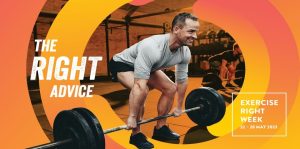May 22nd – 28th 2023
What is it?
Exercise Right Week is an annual awareness campaign created by Exercise Sports Science Australia (ESSA). The aim is to highlight the benefits of exercise for health and well-being and to help people understand where to access the “right” advice.
Each year the campaign has a different theme, this year’s theme is “The Right Advice”, with each day focusing on a different topic.
- Monday: Chronic conditions – Diabetes/Cancer/Disabilities
- Tuesday: Strength training – Resistance/Body weight/Warm ups
- Wednesday: Sports – Netball/Rugby/Triathlon
- Thursday: Cardio Training – Running/High Intensity Interval Training
- Friday: Women’s health – Pregnancy/Post-Partum/Endometriosis
- Saturday: Older Australians – Falls prevention/Heart Heath
- Sunday: Mental Health – Anxiety/Depression
Where to access the “right” advice
There is a lot of misinformation surrounding what exercises to do and how to perform those exercises correctly. This is why it is very important to seek advice from qualified professionals. There are a number of university qualified experts who specialise in exercise prescription for a range of people and can base exercises on your specific needs. These are:
- Exercise Physiologists (EP)
- Allied health professionals who prescribe safe and effective exercise as medicine for a range of medical conditions, injuries, or disabilities. EPs are the most qualified professionals in Australia for exercise prescription.
- Exercise Scientist (ES)
- Professionals with high level training in exercise and sports science. They have the knowledge to improve health, fitness, well-being, and performance.
- Sports Scientist
- Professionals who help athletes improve their performance through advice on training, techniques, nutrition, and recovery.
Recommendations for exercise
The Australian government guidelines for exercise recommend
- Adults (18 – 64 years old)
- Aerobic (cardio)
- 5 – 5 hrs of moderate intensity exercise per week eg brisk walking, swimming
- 25 – 2.5hrs of vigorous intensity exercise per week eg jogging, fast cycling
- Or a combination of both moderate and vigorous activities
- Strengthening
- Should be performed on at least 2 days each week
- Eg squats, lunges, push ups, lifting weights
- Older Adults (65 years old +)
- 30 minutes of moderate physical activity on most days of the week
- Include strengthening, balance, and flexibility activities
- Should be performed on at least 2 days each week
- Aerobic (cardio)
Tips for building activities into your day
Making small changes to your daily routine can make a big difference to your health and to the way you feel. Exercise doesn’t have to be structured or performed all at once or at a set time. For example, you can:
- Get off the bus a stop or two earlier and walk the rest of the way
- Use the stairs instead of a lift/escalator
- Park further away from the shop entrance and walk
- Limit time sitting time at work – use a standing desk, walk during your lunch break
Benefits of exercise
There are numerous benefits of exercise, both physical and mental. Even adding a little bit of exercise can have dramatic effects on your health and the more you are active you are, the more benefit you get. Some benefits of being regularly active are:
- Maintain strong muscles and bones
- Maintain a healthy weight or help with weight loss
- Reducing the risk of or helping manage high blood pressure, high cholesterol, bone and joint issues, cardiovascular disease, type 2 diabetes, obesity related diseases
- Help improve mental health, reduce stress and anxiety
- Improve your energy levels




